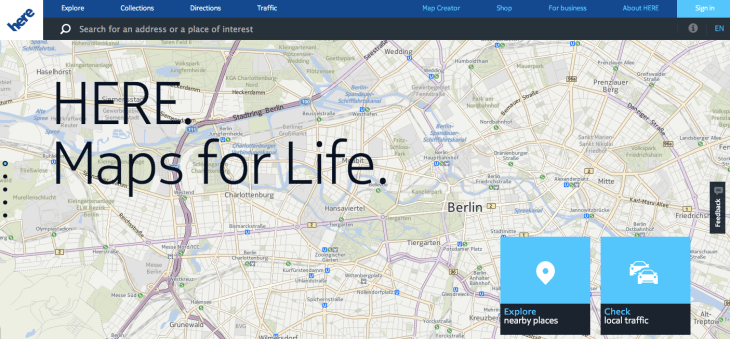Less than two weeks after buying natural language startup Desti, Nokia’s mapping division Here is announcing another acquisition to enhance its service: it is buying Medio Systems, a specialist in predictive analytics that Nokia will use to give users of its location-based services more personalised results and maps.
Or as Here’s VP of search Don Zereski described it to me: “The map I see will be different from the map that you see.”
Nokia is not disclosing the terms of the deal but we are trying to find out.
Medio, based out of Seattle, was founded in 2004, originally setting out to develop a contextualised search engine for mobile phone users but later pivoting to provide a more B2B product, in the form of analytics, predictive modelling, and push marketing based on a company’s users’ data. (A move perhaps spurred by the fact that companies like Google were fast extending their dominance in desktop search to smartphones.)
Medio was venture-backed but it’s not clear how much it had raised in total: the only round listed in Crunchbase is a Series B for $30 million. Investors in that round included Trilogy Equity Partnership, Mohr Davidow Ventures, Frazier Technology Ventures and Accel Partners.
According to its profile on AngelList, other investors in the company include T-Ventures (the investment arm of T-Mobile parent Deutsche Telekom), Verizon Ventures (the eponymous VC arm of the carrier) and a former partner from US Venture Partners.
T-Mobile and Verizon are among Medio’s customers, along with ABC, Disney, Rovio, CBS and Telus.
Unlike Desti, whose app was pulled from Apple’s App Store after the acquisition as Nokia prepared to integrate its technology into the Here platform, the intention will be to keep Medio’s existing business and customer relationships going, Zereski told me in an interview.
But it’s not clear yet whether Here will keep the Medio branding. “I don’t know if we will keep it or not,” Zereski says.
Medio’s existing product offering is divided into three areas — Measure, Predict and Act, with corresponding ability to offer its customers to do things like offer dashboard with real-time customer statistics around how they are using a mobile service; figure out who is most likely to churn away from a service; and then push suggested content to them to keep them from doing so.
Right now, it’s not obvious from Medio’s site that its focus has been specifically on location-based content but that looks like how it will be channeled going forward.
Here’s intention, I suspect, will be to use some form of all three of Medio’s areas of expertise in different aspects of its service. It will be able to offer businesses that use its mapping platform the ability track how and when to market to users based on location; and for consumers it will give them more personalised results when they look at maps and search for places, based on their past search and browsing history.
Zereski tells me these kinds of search results will be complementing, not replacing, the content that Here already provides to users for things like places to eat nearby. An example of one of these kinds of existing searches would be looking for a hotel in Berlin. Right now you can find relevant descriptions and reviews by way of Here’s partnerships with LonelyPlanet, TripAdvisor and others.
With Medio, though, instead of people pulling that kind of information, this will be about pushing more relevant suggestions to people before they ask.
Interestingly, it seems that Medio and Here had already been working together before this acquisition. “We had done some consulting projects over the last four years,” says Zereski. “What became apparent was that their real-time analytics capability was at the core of what we need to do at Here with personalising search, routing and traffic.”
Considering that it looks like Medio’s platform could be used for a variety of applications, the kind of focus on location that Here wanted to get out of it was likely only attainable by way of acquisition and integration. (And since we still don’t know the price of the deal, it could have even come at a steal.) “It’s extremely core to what we do and we decided that we would be better off if they were a part of the platform and not just a service,” Zereski added.
Considering Nokia’s position bracing itself for a mobile future independent (for at least several years) of any direct business in consumer hardware post the sale of the handset business to Microsoft, building out that platform to be more useful is perhaps more essential than ever before.
HERE is at present a fairly small part of Nokia operation. In the first quarter of this year, HERE had net sales of €209 million ($284 million), down 3% on a year ago and down 18% on the previous quarter. HERE represented less than 10% of Nokia’s overall net sales of €2.7 billion ($3.7 billion).
The transaction is expected to close by the end of July, and Nokia is “absolutely” looking to bring on Medio’s 60 employees as part of the deal, Zereski adds.
